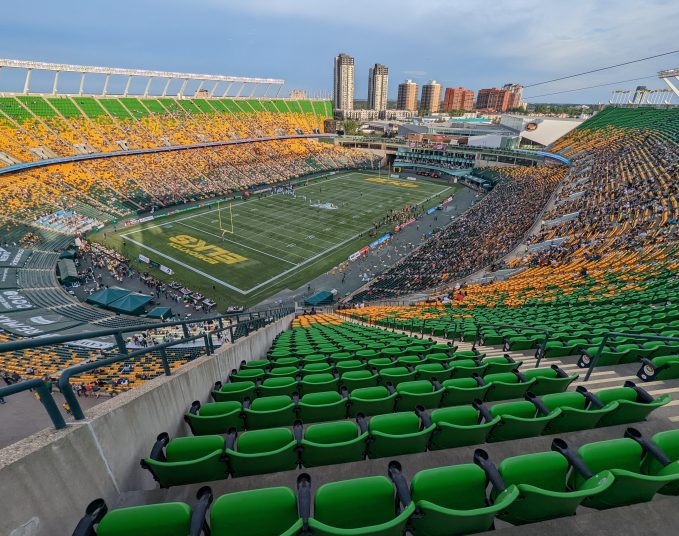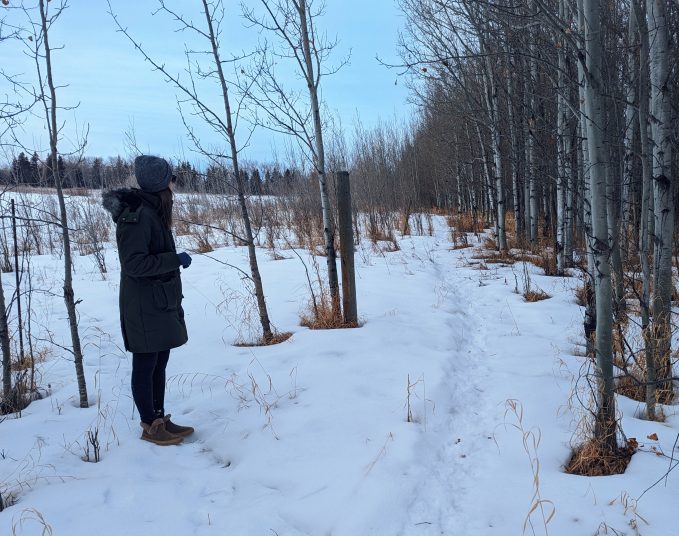The Edmonton Elks have a new five-year lease at Commonwealth Stadium.
The Community and Public Services Committee voted unanimously to accept the new deal, which administration believes will net the City about $1 million per year in advertising, sponsorship and concession revenues.
The committee agreed to waive the license agreement the Elks need to pay for the use of office space, dressing rooms and practice facilities at the Stadium over the first two years of the deal. That will save the Elks a little more than $200,000 per season over those two years.
In its previous 10-year lease deal, the Elks had spent $100,000 per season to include ETS fares into the price of the game ticket. For the next two years, the Elks will be able to redirect that money to “support joint marketing efforts to encourage higher attendance at Edmonton Elks games.”
The team has not won a home game since Oct. 12, 2019.
When it comes to the stadium game, a five-year lease is about as close to a short-term deal as you’ll find. Coun. Anne Stevenson said that, coming out of COVID, the City needs to understand that the Elks need to figure out what the new normal will be when it comes to live sports and events.
“We’ve recognized we’re in a difficult position, [and] don’t know how things will shift, post-pandemic.”
Elks president and CEO Victor Cui said that the team has lost $18 million over the past four seasons. But, even when COVID forced the Canadian Football League to scrub the 2020 season, “we made sure to meet our City obligations and our operating costs.”
But he did admit complacency led to many of the team’s issues. “We got very comfortable with our previous years’ success.” Let’s face it — he’s not wrong. Over the years, the CFL stopped being young or cool. It became white and old. Every year, we saw the same stories of the same old buddies who get together for the Grey Cup. Problem was, we were writing the same old stories about the same old white guys. In effect, these narratives were highlighting the league’s biggest problem — that it was too old, too staid, and too darn old-fashioned.
So, where can the Elks fix things? Cui can’t turn this team into a winner – that’s up to general manager and head coach Chris Jones. But Cui talked Monday about some of the changes that can be made.
SUPPORTING LOCAL
In the wake of criticisms made about the City’s decision to re-up its sponsorship and exclusivity deal with Coca-Cola, it’s clear Mayor Amarjeet Sohi and council are starting to feel the political heat when it comes to the perception that they do not support local beverage makers.
Sohi took the lead in asking Cui if there is any room for local food or beverage providers at Elks games. The team has an exclusive beer agreement with Molson, but the food and beverage deals come up, soon.
“We hear often from local vendors that they don’t have access to City-owned facilities,” said the Mayor. “If there are exclusivity agreements… how do we open it up for local?”
“Exclusivity is one factor we consider,” said Cui. “If someone pays for that, there’s the economic side of the equation. But I would say, as a guiding principle, we’re trying to do business first with local businesses, and showcase that wherever we can.”
TICKET REVAMP
Cui said the Elks have revamped the ticket-pricing structure for the first time since 2003.
“How do we understand the challenges that Edmontonians are facing?”
That means the cheapest tickets have been lowered to $15 a pop, while children under 12 can get free tickets.
“We look at this as a night to bring the family together.”
FAN ZONE
At the East End of the stadium, Cui said the plan will be to give different community groups and cultural organizations the chance to use the Fan Zone. They can use that space to promote themselves.
Cui said it’s about “How to reimagine that space to activate our community partners.”
It’s also a way to bring different cultural flavours to the games.
As one of the very few non-white executives in the CFL, Cui said the issue of diversity is very personal to him.
“If we show value back to community, they’ll come back and support us,” he said. “We know those initiatives work — by giving first.”
COMMONWEALTH’S FUTURE
Yeah, maybe we don’t need to belabour the point that Edmonton’s bid to get 2026 World Cup Games ultimately ended up in failure. But the bid required partnership from the Elks, who would have been willing to rejig their schedules and move practice facilities in order to accommodate the big event.
Cui said that Commonwealth Stadium continues to be a showpiece for the city, but that we might have to think less about attracting large, traditional big-name events and going after the up-and-coming sports. Commonwealth has already hosted a World Cup Big Air Snowboarding event, with a man-made ramp that extended from above the roof of the stadium to field level.
“There is no way you can walk into this stadium and not be in awe,” he said.
“How can I be the ambassador to go across the world and showcase this?”
He said there are a many sports that “are far more turnkey” than soccer’s World Cup would have been. From crossfit to ultimate frisbee, he sees Commonwealth as a place where the world can come and play.
(Just not soccer.)
Savvy AF. Blunt AF. Edmonton AF.




